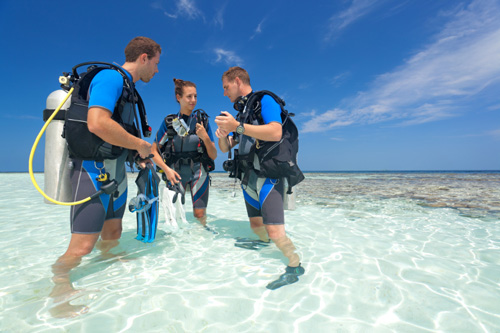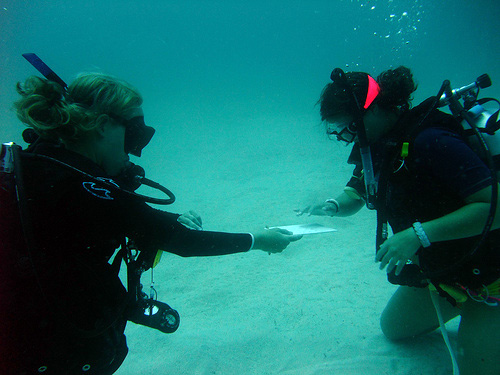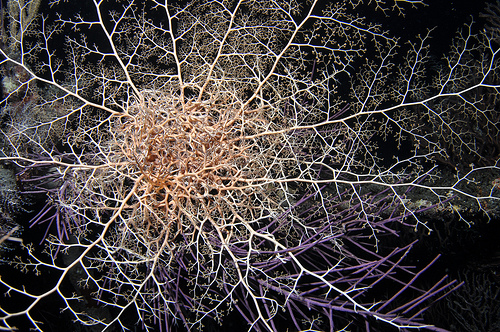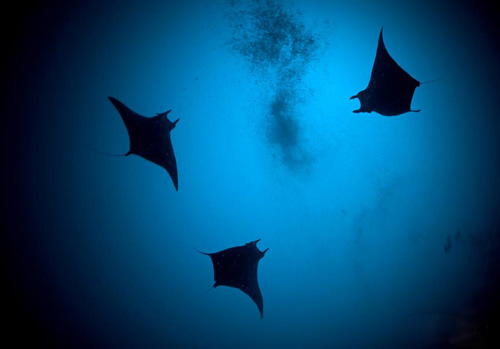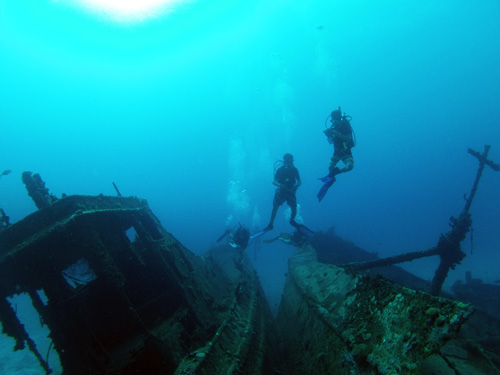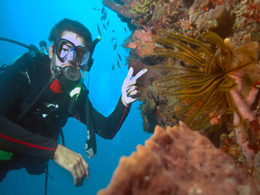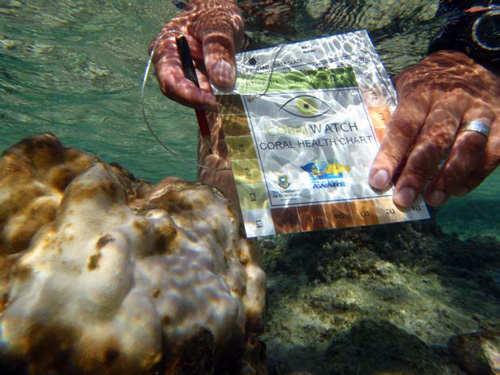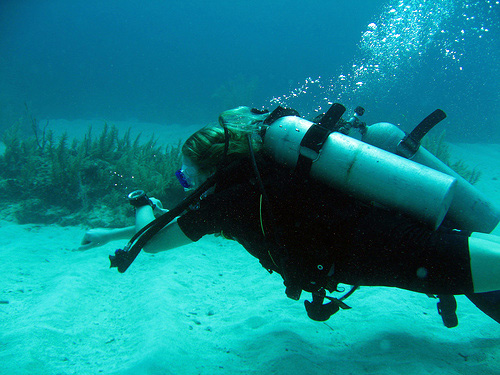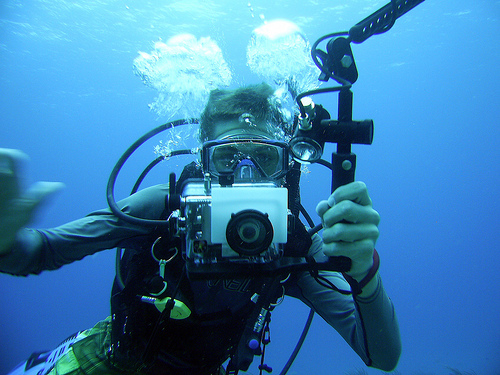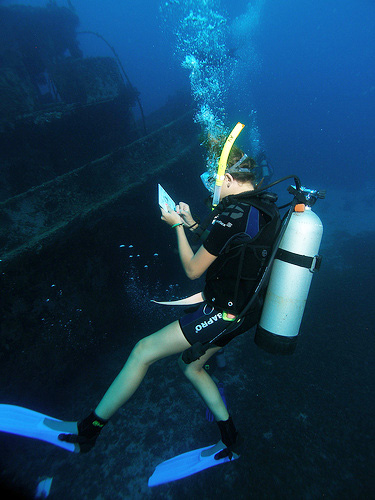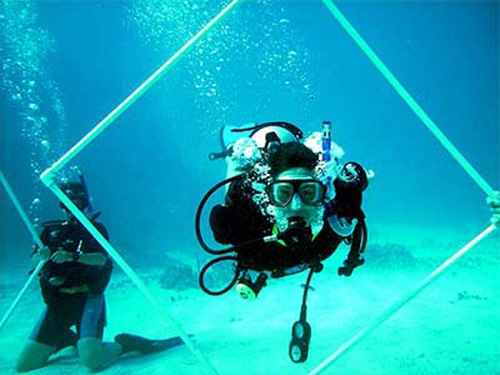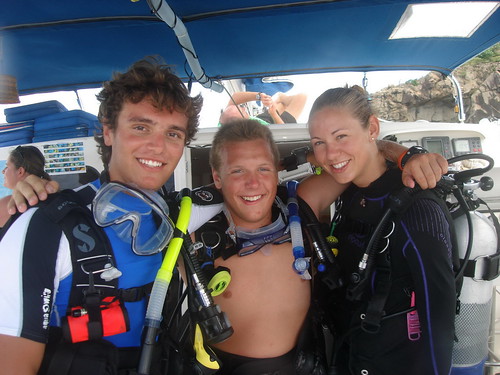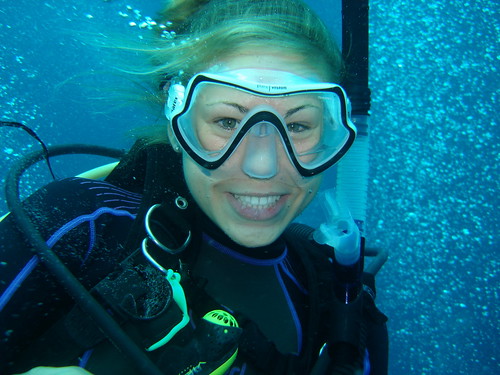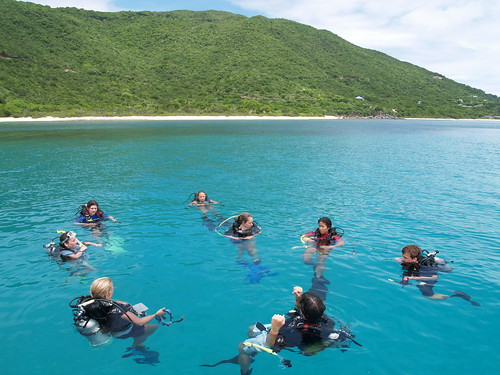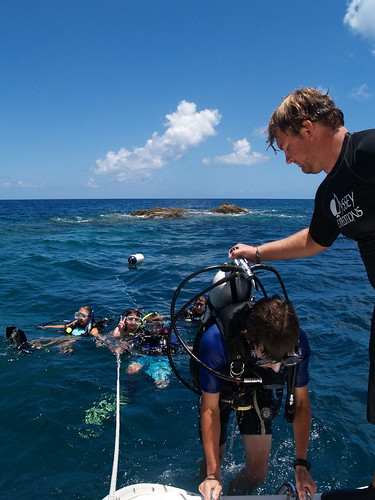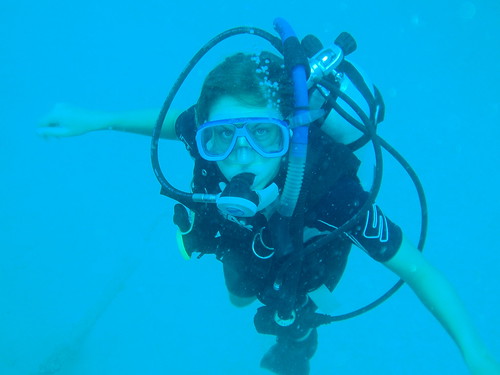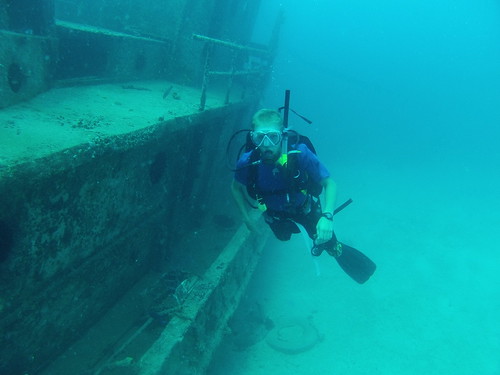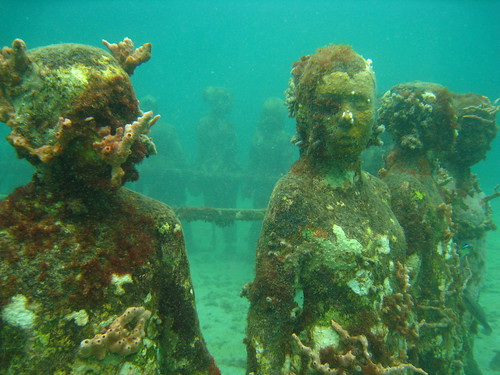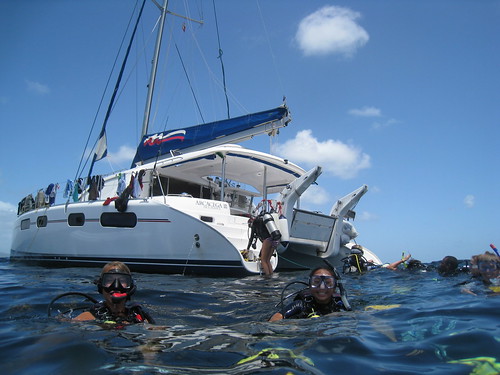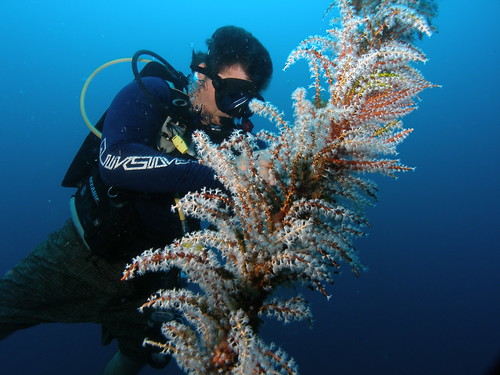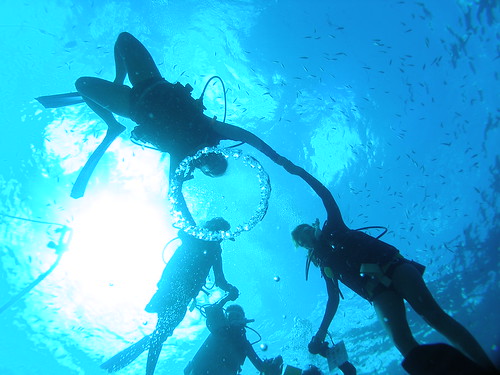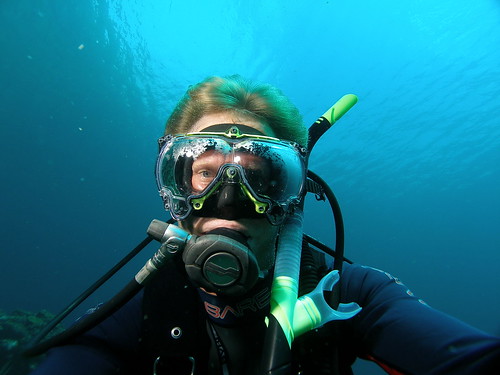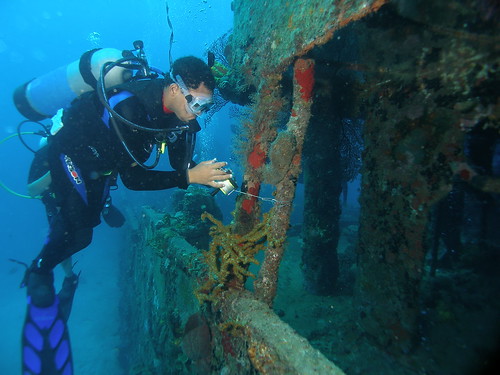
Learn to SCUBA Dive, earn PADI certifications, and Dive, Dive, Dive with Odyssey Expeditions Teen Summer SCUBA Camp.
All voyages feature Marine Biology and Sailing while living aboard a 45 foot sailing catamaran in June, July, and August.
Discover Adventure programs are 14 Day voyages.
No prior SCUBA experience necessary! Learn to SCUBA dive.
Advanced Adventure progams are 21 Day voyages.
Open Water SCUBA certification is a prerequsite
Queen Parrotfish, Flamingo Tongue, Elkhorn Coral, Eagle Ray, Tiger Grouper, Batwing Coral Crab, Lizard Fish...does it sound like a jungle? These are just a few of the names of the undersea life we will encounter. An integral part of each voyage, SCUBA diving at the islands' premier locations for underwater science activities, PADI SCUBA certifications, and just fun may be the highlight of your voyage. Our skilled and experienced PADI diving instructors ensure you safe, supervised dives and assist you in finding a diverse array of marine life. A broad range of PADI diver education course offerings allow all divers to improve their skills, whether they are new to diving or have logged 100 dives. Specialty PADI SCUBA certifications introduce exciting environments.
As we dive directly off of our catamarans, the diving is easy without long boat rides to and from dive sites. Training is conducted in a variety of locations and habitats allowing for a wide exposure to the marine environment. When courses require confined water, we anchor in shallow, clear bays, while advanced and specialty courses take us to sunken shipwrecks, coral reefs, pinnacles, seamounts, and walls dropping into the abyss. All diving is done with full safety equipment including advanced diving computers, which increase safety and allow for extended bottom times. Whether it's your first breath underwater or you are a divemaster candidate, class sizes are small to promote safety and personalize instruction. Our instructors present the lessons in clear, comprehensible formats at a comfortable pace.
Odyssey Expeditions is a PADI 5 Star Resort training facility and maintains the highest standards in dive training, safety, and excellence. Each sailing catamaran is outfitted for adventure with scuba equipment, tanks, and lights for all divers. A compressor and emergency oxygen system aboard each catamaran allow for independent schedules and lead to more diving and fun.
Dive on flourishing coral gardens with schools of snappers and grunts synchronizing their movements. Look close and see small reef octopi hiding in lairs and be visited by a curious stingray gliding by. Perfect your underwater navigation skills and be ready to map and safely penetrate into the bridge, cargo compartments and engine room of large shipwrecks as you earn your Wreck Diver certification. Take part in documenting the biological diversity of these great sites as you earn Underwater Photographer certification using digital still cameras which allow instant feedback on photography technique.
PADI - The Professional Association of Diving Instructors, is the world's leader in diving education, setting the highest standards in safe and quality instruction.
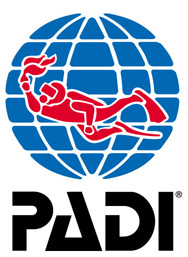
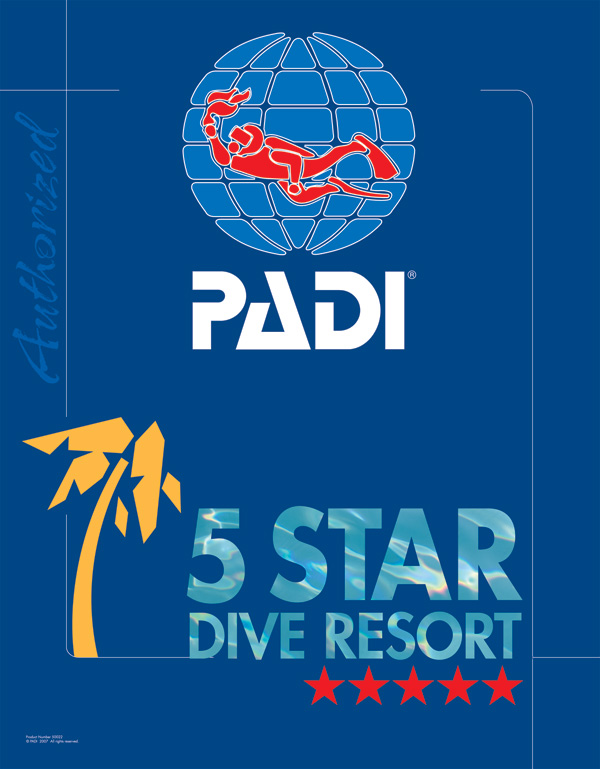
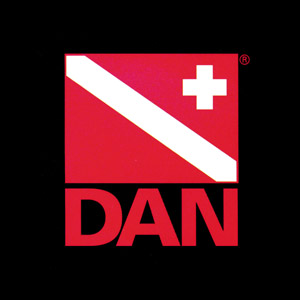
There are several reasons why it is good for teenagers to learn and get certified in scuba diving:
- SCUBA diving is a unique and exciting way for teenagers to explore the underwater world.
- Learning to SCUBA dive can help teenagers develop confidence, problem-solving skills, and a sense of accomplishment.
- Scuba diving can also be a great way for teenagers to stay physically active and improve their physical fitness.
- Getting certified in scuba diving can also open up new job and career opportunities for teenagers, particularly in the field of marine biology or marine conservation.
- Finally, scuba diving can be a fun and social activity that teenagers can do with their friends and family.
All voyages feature marine biology, scuba diving, and sailing instruction aboard 45' sailing catamarans.
-
Open Water Diver
- This is where adventure stars. Scuba diving is easy and fun to learn. The PADI Open Water Diver course is the first step of becoming a well rounded diver. This course consists of three main phases:
- Academic classroom: to understand basic principles and theory of scuba diving.
- Training in shallow water: like a swimming pool, to learn basic scuba skills.
- Open Water Dives: to review your skills and explore!
Students are always with an instructor. PADI courses are performance-based rather than time-based. This means that if a student is having difficulty with any particular skill, our instructors will work one-on-one with that shipmate until the skill is mastered.
-
Advanced Open Water Diver
- Exploration, excitement and experiences are what scuba diving is all about. The Advanced Open Water Diver Course provides the novice diver with a structured, well-supervised means to gain the practical experience to safely explore underwater in varying conditions and environments. Two of the five areas are required topics; the Deep Diving and Underwater Navigation, and we add three more topics such as Night Diving, Wreck Diving, Boat Diving and Underwater Naturalist.
-
Rescue Diver
- How to be the ultimate diving buddy, designed to enhance your ability to prevent and mangage problems underwater. Includes PADI Emergency First Responder certification. During the course, you learn by practing problem solving skills until they become second nature. Training in assisting a tired or panicked diver, search and recovery, self-rescue, unconscious diver management and egress and accident management. Role-playing makes this course fun while developing our skills.
- PADI Rescue Diver certification teaches valuable skills that can help divers prevent and manage diving emergencies. These skills are essential for any diver who wants to be prepared for unexpected situations.
- Rescue Diver training can help divers develop a greater sense of responsibility and leadership, as they learn how to assist and supervise other divers in need.
- Earning PADI Rescue Diver certification can boost a diver's confidence and improve their overall diving skills and abilities.
- Rescue Diver training can help divers learn how to handle stress and panic, which are important skills to have in any emergency situation.
- PADI Rescue Diver certification is a prerequisite for many advanced diving programs, such as Divemaster and instructor training.
- Rescue Diver training can be a fun and rewarding experience, as divers have the opportunity to learn new skills and work with other divers in a team environment.
- Earning PADI Rescue Diver certification can open up new job and career opportunities in the diving industry.
- Rescue Diver training can help divers develop a greater understanding of dive theory and dive safety, which can help them become more knowledgeable and safer divers.
- PADI Rescue Diver certification is recognized worldwide, so divers who earn this certification can dive with confidence wherever they go.
- Finally, earning PADI Rescue Diver certification is a great way for divers to give back to the diving community and help make diving safer for everyone.
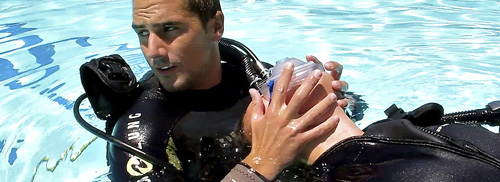
-
Night Diver
- As the sun sets, you don your dive gear, slip on your scuba mask and bite down on your dive regulator. A deep breath and you step off the boat – into the underwater night. Although you’ve seen this reef many times before, this time you drop into a whole new world and watch it come to life under the glow of your dive light. Introduce yourself to the whole new cast of critters that comes out after the sun goes down. See your favorite dive sites from a whole new perspective at night.
-
Deep Diver
- After your first few scuba dives, you soon want to explore a bit deeper. There’s something exciting and mysterious about the depth that attracts dives. Many shipwrecks are often found in deeper water. That’s why the PADI Deep Diver course is a natural companion to the PADI Wreck Diver course.(must be 15yrs old)
-
Wreck Diver
- Whether sunk on purpose as an artificial reef or the result of mishap, wrecks open fascinating windows to the past. Most divers find wrecked ships, airplanes and even automobiles nearly irresistible because they’re intriguing to explore, exciting avenues of discovery, and usually teeming with aquatic life. The PADI Wreck Diver course teaches you the ins and outs of rewarding, responsible wreck diving.
-
Fish Identification
- "What was that?” The Fish Identification Specialty course provides you with the fish identification basics so that next time, you know the answer. You’ll find you enjoy your dives even more when you recognize the creatures that you see. The fun part about this course is you can use the skills you learn on every scuba diving vacation because once you learn the main fish families and characteristics it will help you decipher the species you see all over the world.
-
Coral Reef Conservation and Coral Watch
- Designed to inform you about the world’s coral reefs. As a scuba diver, the health of aquatic ecosystems is often what makes a good dive. Become aware of the fragileness of coral reefs and how you can help preserve them. CoralWatch integrates global monitoring of coral bleaching with education about coral reef conservation.
-
Underwater Naturalist
- Look closer to see more on your next dive. Look for symbioses, predator/prey and other relationships between aquatic plant and animal life. Learn not just what fish and animals are, but how they interact with each other and the environment. Jellyfish that have adapted to the underwater environment - it no longer needs to sting. Learn about why some creatures behave the way they do and what their role is in the aquatic ecosystem.
-
Underwater Navigator
- Be the diver everyone wants to follow and make your sense of direction legendary with the PADI Underwater Navigator Specialty course. Underwater navigation can be challenging, but in the PADI Underwater Navigator Specialty course, you master the challenge. You learn the tools of the trade, including navigation via natural clues and by compass, underwater map making, estimating distances underwater, and marking or relocating a submerged object or positions form the surface.
-
Underwater Photography
- Underwater photography is one of the most popular diving specialties, and the rise of digital underwater photography has made it easier and more fun than ever. The Underwater Photographer course gets you going quickly with todays modern digital equipment, whether you use a point-and-shoot snap camera or a sophisticated D-SLR like the pros.
-
Underwater Researcher
- The Odyssey Underwater Research course is a "distinctive" specialty, meaning that it's only available through Odyssey! It is designed to teach our students the basic techniques and methods used to conduct underwater research. You will learn all about the scientific method, as well as the guidelines and basic procedures used while research diving. In the water, we'll use transect lines and quadrats and even ROV operation as well as other measuring and observation techniques.
-
Peak Performance Buoyancy
- Excellent buoyancy control is what defines a skilled scuba diver. What is neutral buoyancy? Scuba divers like to be neutrally buoyant so they neither sink nor float. It can be a tricky thing. Divers who’ve mastered the highest performance levels in buoyancy stand apart. You’ve seen them underwater. They glide effortlessly, use less air and ascend, descend or hover, almost as if by thought. They interact gently with aquatic life and affect their surroundings minimally. The Peak Performance Buoyancy course refines the basic skills you learned as a Open Water Diver and elevates them to the next level.
-
Emergency First Response & CPR
- Take a step toward emergency preparedness and meet PADI Rescue Diver prerequisites with Emergency First Response. As one of the foremost international CPR and first aid training companies, Emergency First Response gives you the confidence to respond to medical emergencies - not just in the diving world, but in your every day world with your family, friends, and neighbors too.
It is possible to take the some course academics online with
PADI eLearning prior to arrival, click here for more information
PADI eLearning




